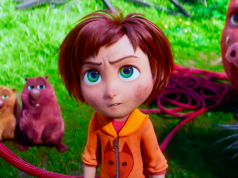We need to accept first of all that any movie about apes becoming intelligent and overrunning the human race is, by its very nature, ridiculous. Monkeys — I know there’s a difference between monkeys and apes, but I don’t care — are funny. Seeing monkeys do things that humans do is funny. There is no way around this. No movie about an uprising of intelligent apes is ever, ever going to seem completely plausible.
That being said: sweet fragrant bananas, “Rise of the Planet of the Apes” is a blast. This is sharp, thrilling summertime fun here, a movie that addresses its inherently ridiculous premise with a straight face and dares you not to take it seriously. You say this is goofy stuff? Just CGI apes running around causing mayhem? Then why are you so emotionally invested, huh? HUH?? It’s everything a person can reasonably hope for in a “Planet of the Apes” prequel, and maybe a little more.
Er, once it gets past its clunky first act, that is. The humans are always the letdown in a monkey movie, aren’t they? Our primary homo sapiens here is Will Rodman (James Franco), a genetic engineer at a San Francisco pharmaceutical company who’s feverishly working on a drug that enhances brain function. The hope is that it will reverse the effects of Alzheimer’s — which, you will not be surprised to learn, is now afflicting Will’s father (John Lithgow). Chimpanzees are the test subjects; sure enough, they show signs of getting smarter. This will definitely end well, just as it always does when scientists in movies make animals smarter!
The film lays down the details just enough to get them out of the way, but the gist of it is that Will winds up being the caretaker of a chimp named Caesar. As time passes, Caesar shows that he has benefited greatly from Will’s wonder drug, learning sign language, solving problems, and apparently understanding human speech to a remarkable degree. He has soulful, intelligent eyes. We feel a certain sadness about him, the way we did with the kid in “A.I.,” who was a real boy and yet not a real boy. When Will and his veterinarian girlfriend Caroline (Freida Pinto) take Caesar to the redwood forest, it’s the first time the laboratory-born ape has truly experienced life the way nature intended it. But even then, he’s wearing pants.
“Rise of the Planet of the Apes” (2011) B+
“Dawn of the Planet of the Apes” (2014) B
“War for the Planet of the Apes” (2017) B+
Gradually, the story lets Will fade away so that Caesar and his fellow primates can take center stage. There is a facility for displaced apes, run by the relatively humane John Landon (Brian Cox) and his significantly less humane son (Tom Felton). Here Caesar can at last interact with his kind — except that his intelligence means he’s not really their kind anymore. Unlike the other monkeys, Caesar can make plans.
Apart from a couple of awkwardly placed shout-outs to the 1968 original, “Rise of the Planet of the Apes” makes the bold choice to eschew campiness and treat the story earnestly, trusting that the technology responsible for the apes and the director responsible for the storytelling will prove so compelling that we don’t mind suspending just a little more disbelief. The gamble pays off. The director, Rupert Wyatt, has only made one feature before — a mesmerizing prison-break thriller called “The Escapist” — and his relative inexperience is manifested as humility. His style is confident, but subtly so; he creates tension, drama, and exhilaration without showing off.
The technology holds up its end of the bargain, too. All the animals were created by filming actors in motion-capture suits and digitally animalizing them. Caesar is played by Andy Serkis (best known as Gollum in “Lord of the Rings”); the ape’s movements and facial expressions — especially those eyes — are essentially Serkis. Think of it as an actor in an ape suit and makeup, except that the ape suit and makeup were digitally added in post-production. Now, I don’t mean to say that the apes always look 100% like real animals (although sometimes they do), only that they’re close enough that we accept them. More importantly, they emote, and they do so convincingly. As long as they capture our interest, it doesn’t matter whether they’re made of flesh, latex, or pixels.
The quality of the computer-enhanced actor-monkeys reflects the movie’s success as a whole. We buy them as real animals the same way we buy all the other preposterous things that comprise the film. Every now and then I’d think, “Wait, Caesar can’t do that. He’s a chimp!” Then I’d remember, “Oh, right, but he’s been given a drug that makes him super-intelligent. OK, then!” And I’d buy it! Whatever it was he was doing that seemed extraordinary for a monkey, I bought it! This is a film that makes us gasp and marvel and laugh, and then marvel further that such an absurd thing has managed to captivate us.
B+ (1 hr., 45 min.; )





